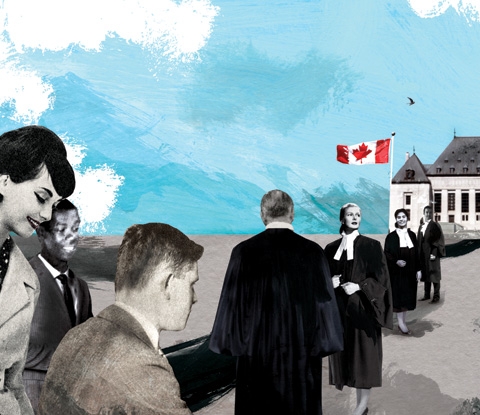By Alvin Yau, 1L / Illustration by Tara Hardy
On February 26 and 27, the David Asper Centre for Constitutional Rights and the Centre for Constitutional Studies at the University of Alberta co-hosted a symposium on constitutional law at the University of Toronto Faculty of Law. This year’s symposium theme dealt with the issue of “the State of Canada’s Constitutional Democracy” and it featured remarkable insight from distinguished speakers and guests from across the country and from abroad.
The Asper Centre’s executive director Cheryl Milne, the Centre for Constitutional Studies’ executive director Patricia Paradis, and Faculty of Law Professor Lorraine Weinrib opened the symposium by setting out the objectives of the two-day event, and moderated the lively discussions.
Distinguished guests presented their papers on diverse issues of constitutional affairs such as democratic processes, Parliamentary functions and reform, governance, and public appointments. Some notable presenters included renowned constitutional law experts such as Professor Mel Cappe from Massey College, the Honourable Irwin Cotler, Dean Hugo Cyr from the Université de Québec à Montréal, and Professor Robert Hazell from University College London.
Faculty of Law Professors Yasmin Dawood, David Schneiderman, and Lorraine Weinrib added interesting topics of discussion when they respectively presented their papers on electoral reform, judicial appointments, and the division of judicial powers in government. These topics helped explain some of the issues that affect modern Canadian politics from a constitutional law perspective.
Professor Dawood’s paper considered the question of having a referendum on electoral reform and the alternative voting systems within the framework of our Constitution and political system. The question of electoral mandates and the ability of the government to reform voting methods was discussed within the context of recent campaign promises made during the 2015 federal election. Similarly, Professor Schneiderman discussed trends in recent Canadian judicial appointment and how they were reported by the press throughout the tenure of the previous governments. Lastly, Professor Weinrib examined the need for well-articulated statutory purposes in legislation that is being challenged in court. Indeed, from the perspective of the Crown attorneys being tasked with advancing the government’s legal position on the impugned legislation, the necessity of clearly articulated legislation has a renewed importance in modern court challenges.
Current SJD candidate Jennifer Raso and JD/MPP candidate Benjamin Hanff added to the discussion with presentations respectively dealing with the application of statistics to the judicial system and the public understanding of Parliamentary processes. The former paper explored the changes to our public service’s capability given reforms with statistical data collection under the previous government and how its impact on social policy. Along those lines, the latter paper explored Parliament’s ability to shape public perception of Parliament’s role through increasing the scope of political communications beyond its traditional limits.
With such a variety of interesting topics being discussed and so many activities going on, current JD student Debbie Boswell helped ensure that the student volunteers could make the symposium run flawlessly during the two days.
At all times, the questions of constitutional rights and its role in Canadian democracy were examined through diverse perspectives from academia, the public service, and Parliament itself prompting a lively atmosphere for idea-sharing and critical discussion of these fundamental issues involving the constitution, democracy, and governance.
As the event came to a conclusion on the second day, the conversation of the symposium remained lively and dedicated to exploring the challenges of modern Canadian society and its interactions with constitutional law.

